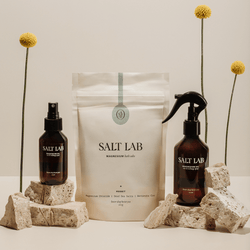Why You Might Be Feeling Sluggish
Feeling sluggish and low on energy could be a sign that your body is craving magnesium! Here’s how this essential mineral helps keep you energised:
Regulating Stress and Sleep
Magnesium plays a significant role in regulating the hypothalamic-pituitary-adrenal (HPA) axis, which controls your body's response to stress. This system influences the production of cortisol, a stress hormone. When your magnesium levels are adequate, it helps modulate the release of cortisol, promoting a balanced stress response. This means you're less likely to experience the extreme highs and lows that stress can cause.
Additionally, magnesium promotes relaxation by interacting with neurotransmitters in the brain that are responsible for calming the nervous system. By supporting a healthy stress response and promoting relaxation, magnesium can help improve sleep quality. Better sleep means you wake up feeling refreshed and energised, ready to take on the day.
Cellular Energy Production
Magnesium is essential for the production of adenosine triphosphate (ATP), the main energy currency of cells. ATP is produced in the mitochondria, the powerhouse of the cell, through a process called oxidative phosphorylation. Magnesium acts as a cofactor in this process, meaning it helps enzymes in the mitochondria function properly. Without sufficient magnesium, ATP synthesis is impaired, leading to decreased energy levels.
In essence, magnesium helps ensure that your cells can produce and store energy efficiently. When your cells have enough energy, your entire body feels more vibrant and lively.
Muscle Function
Magnesium plays a crucial role in muscle function. It helps regulate muscle contractions and relaxations by balancing the actions of calcium. When a nerve stimulates a muscle, calcium is released into the muscle cells, causing them to contract. Magnesium then helps the muscle cells relax by blocking calcium's actions. Without adequate magnesium, this balance is disrupted, leading to muscle cramps, spasms, and fatigue.
Proper muscle function is essential not only for athletes but for everyone in their daily activities. Adequate magnesium levels ensure smooth muscle function, reducing muscle fatigue and cramping that can drain your energy. This means you can move more freely and feel more energetic throughout the day.
How Magnesium Enhances Nutrient Absorption
Magnesium is crucial for activating enzymes that help break down nutrients. This process is vital for converting the food you eat into forms that your body can readily use for energy and repair.
Enzyme Activation
Enzymes are proteins that speed up chemical reactions in the body. Many of these reactions involve breaking down food into smaller components that your body can absorb. Magnesium acts as a cofactor for over 300 enzymatic reactions, meaning it helps enzymes perform their functions more effectively. For instance, magnesium-dependent enzymes are involved in the metabolism of carbohydrates, fats, and proteins.
By activating these enzymes, magnesium ensures that the food you eat is properly digested and absorbed, allowing your body to get the nutrients it needs to produce energy.
Nutrient Absorption
Efficient nutrient absorption is crucial for maintaining energy levels. When your body can effectively absorb vitamins and minerals from your diet, you get a natural energy boost. Magnesium helps maintain the integrity of the digestive system, ensuring that nutrients are absorbed in the intestines.
Enhanced nutrient absorption means more energy for you! This not only keeps you feeling alert and active but also supports overall health and well-being.
Enjoy a Balanced Diet with Essential Nutrients
Maintaining adequate magnesium levels is essential for overall health. It supports your body's ability to absorb and use essential nutrients, promoting overall health and vitality. If you're feeling sluggish, it might be time to check your magnesium intake and make sure you're getting enough of this powerhouse mineral.
Consider Magnesium Supplements
If you find it challenging to get enough magnesium from your diet alone, consider magnesium supplements. Magnesium supplements come in various forms, such as magnesium oxide, magnesium citrate, and magnesium chloride. It's essential to choose a supplement that suits your needs and consult with a healthcare professional before starting any new supplement regimen.
The Bottom Line
Magnesium is a powerhouse mineral that plays a vital role in keeping your energy levels up. From supporting cellular energy production to regulating muscle function and enhancing nutrient absorption, magnesium is essential for maintaining vitality and overall well-being.
Incorporating magnesium-rich foods or supplements into your routine can help ensure your body has the fuel it needs to stay energised and functioning at its best. Remember, a little boost of magnesium can go a long way in keeping you lively and active!
















